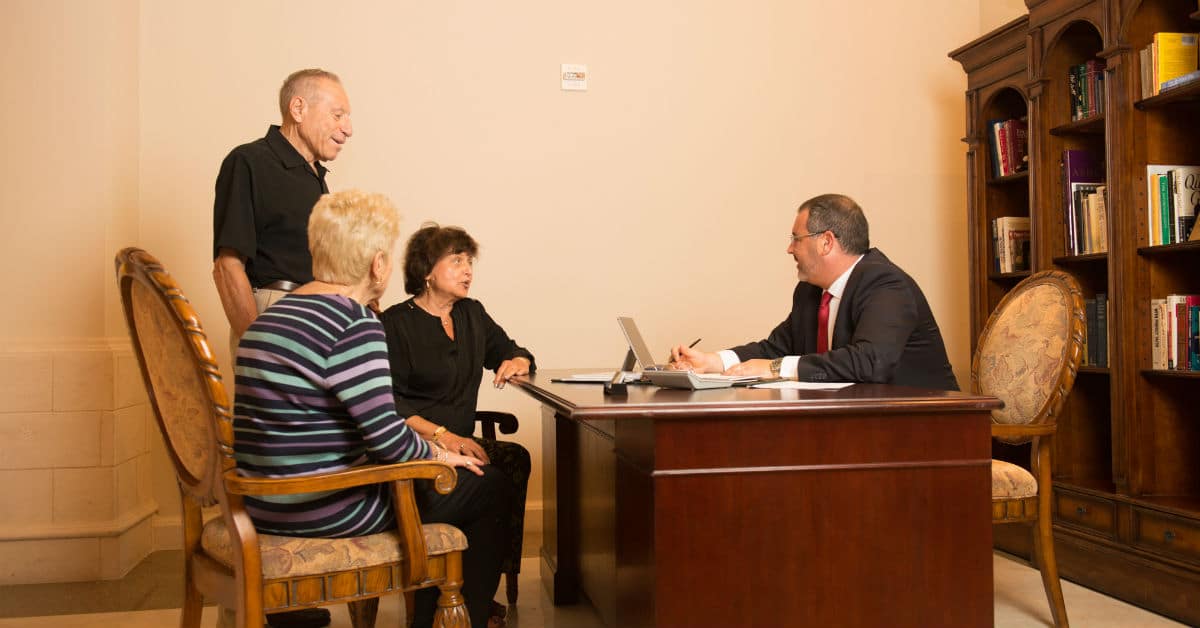Why Plan Ahead? – The Benefits of Pre-Planning a Funeral
There are many benefits to pre-planning funeral arrangements and expenses. None are more significant than the peace of mind you’ll receive from knowing that you’ve arranged all of your final wishes, that they have been documented in a contract, and that your family will not have to worry about these details at your time of death. Most people describe a feeling of peace and comfort after they’ve made their final arrangements.
The benefits will go beyond your own peace of mind. While no one wants to think about their own death, fewer make plans for what happens after they die. Pre-planning your funeral is one last favor you can do for your family. It’s a responsible action that will help those left behind and further your legacy in their hearts. Your family will have the direction they need to ensure that your wishes are met, taking away any guesswork. It can relieve them of the sense of second-guessing themselves, wondering what you would have wanted, and more. Having documents and instructions that clearly explain your intentions can be extremely helpful in times of grief.
Pre-planning your funeral expenses and arrangements can help your family focus on healing and reflecting once you are gone. If you’re looking for more information for planning ahead, contact us today to speak with a funeral pre-planning expert who can guide you through the process.
Make a Plan Your Loved Ones Can Follow
Planning for the future is a natural and important part of our everyday lives. We contribute to retirement plans, take out life insurance, and write wills. As your family matures, pre-planning your funeral becomes part of this important planning process.
There is a cost savings for funeral planning ahead of time with The Gardens of Boca Raton. You will receive a private, dedicated meeting with our staff. The funeral director will speak with you about your wishes and help you develop a plan that meets your needs. We keep this information on file and, at the time of need, relay your selections to your family and estate representatives, relieving them of the anxiety involved with making rushed decisions.
In addition to pre-arrangement services, we offer guaranteed funeral costs through pre-paid funeral plans where your payment is invested into a trust account. The deposited funds will accrue interest until the contract is fulfilled (when the services and supplies are delivered) or canceled. Our plan allows you the option to cancel, change, or transfer your arrangement at any time in the years ahead, as stipulated in your funeral service contract.
We will be pleased to answer any questions you may have about your prepayment options and funeral planning.
Save Money — Buy Your Burial Place Ahead of Time
Some people get insurance policies that pay within 48 hours, which helps cover funeral expenses, but not all policies are designed as such. Preplanning your final arrangements in advance allows you to pay for your funeral services and property over time. If not arranged in advance, all of the costs must be paid all at once at the time of need.
By paying for your funeral ahead of time, you’ll be locking in today’s price rather than the higher costs that will apply years from now. From caskets to urns to tombstones or burial spaces, you can save money by paying for things ahead of time.
Save Your Family From Added Stress
If you have ever had to plan a funeral for a loved one, you know how difficult it can be. The time after a death is very stressful, and we can help mitigate that anxiety beforehand. You can pay for your funeral and cemetery property ahead of time, plan out how and where you’d like to be buried, and let everyone know your wishes.
Take Tough Decisions Out of Your Family’s Hands at a Difficult Time
Your loved ones will likely be grief-stricken, which complicates making financial decisions and planning an event. Why make your family decide if you should be buried or cremated, which cemetery you should be buried in, or whether to bury you in the state where you live or where you grew up? Make the tough decisions for them and alleviate some of their stress.
Be Celebrated the Way You Want To Be Celebrated
You can be in charge of personal decisions, such as the types of music you’d like to be played, who you’d like to speak at your funeral, and even what thoughtful or interesting events might happen at your funeral. This is a great chance to share your love with your family one last time, and it should be built around your wishes rather than what your family guesses you’d like.
Solidify Your Wishes Without Time Constraints
The most important reason to start your funeral planning, including making pre-paid funeral plans, is that there is no way to foresee when your family may need them. Unfortunately, many funerals are sudden. For this reason, it is crucial to make sure that your loved ones are aware of your wishes, and if you choose to make pre-paid funeral plans, begin the funding process.
Get the Quality and Value You Want
Since you’ll have more time to plan your funeral, you can shop around for the best prices and the best values on the things you’ll have to buy, like a casket or urn. You can even visit the funeral homes and see which ones you think would work as the best spot for a celebration of your life.
How Early Should I Start Pre-Planning?
There is no right or wrong answer when deciding how early to start pre-planning your funeral. However, it is always better to start your pre-paid funeral plans as soon as possible for several reasons.
We commonly hear that individuals begin the funeral planning process after the death of a loved one, which can be stressful. Additionally, conflicts may arise when family members are not sure of what the deceased’s wishes are. By planning your funeral on your own, your loved ones will not face these overwhelming time constraints and many decisions.
Here at The Gardens of Boca Raton and Boca Raton Funeral Home, we seek to take the burden from loved ones during such a difficult time. Presenting them with the funeral plans you have selected yourself is one such way of doing so.
Our team of professionals will help you with your funeral planning process, no matter your age or circumstance. Some individuals make plans while they are young and in good health. While it may be challenging to think about, it can be highly beneficial.
Funeral Planning Checklist
When pre-planning a funeral or creating pre-paid funeral plans, there are several things that you will need to take into consideration. Our family is here to guide you the entire way, but this list will give you an idea of the required work.
We offer a free online funeral planning guide for those who wish to begin exploring their options from the comfort and privacy of their own homes.
The following is a checklist of some details that will come up. Even if you’ve pre-planned your funeral, your loved ones will still have to take action on certain items.
- After a death has occurred, the following are some questions we may ask when you call:
- What is the full name of the deceased?
- What is the location of the deceased (Hospital, Nursing Facility, or Residence)?
- What is your name, address, and telephone number?
- What is the name, address, and phone number of the next of kin?
- Is there a pre-arranged funeral plan? (If yes, what is the plan name or number?)
We will then set an appointment time for you to come to the funeral home to complete the details of the funeral arrangement. We will ask you to bring in some items and information that will be necessary to complete the arrangement. These items will include:
- Clothing for the deceased
- Social security number of the deceased
- The deceased’s birth date and city and state of birth
- The deceased’s parents’ names, including their mother’s maiden name
- Information about the deceased’s education
- Marital status of the deceased
- Veteran’s discharge papers or Claim Number
- A recent photograph of the deceased
- Pre-arrangement paperwork (if applicable)
- Cemetery lot information (if applicable)
- Contact your clergy. Decide on a time and place for the funeral or memorial service (the services may be held at the funeral home).
- Make a list of family, friends, and business colleagues, and notify each by phone. You may wish to use a “branching” system: make a few phone calls to other relatives or friends and ask them to make a phone call or two to specific people.
- Decide on an appropriate charity to which gifts may be made (church, hospice, library, organization, school).
- Gather obituary information, including a photo, age, place of birth, cause of death, occupation, college degrees, memberships held, military service, outstanding work, and a list of survivors in the immediate family. Include the time and place of the funeral services. The funeral home will usually write the obituary and submit it to the newspaper(s).
- Arrange for family members and/or close friends to take turns answering the door or phone. Keeping a careful record of visitors and flower deliveries will make it easier to thank people later on,
- If Social Security checks are deposited automatically, notify the bank of the death.
- Delegate special needs of the household, such as cleaning, food preparation, etc., to friends and family who offer their help.
- Arrange hospitality for visiting relatives and friends.
- Select pallbearers and notify the funeral home. (People with heart or back difficulties may be named honorary pallbearers).
- Plan for the disposition of flowers after the funeral (to a church, hospital, or rest home)
- Prepare a list of people to receive acknowledgments of flowers, calls, etc. Send appropriate acknowledgments, which may be a written note, printed acknowledgments, or both. Include “thank yous'” to those who have given their time, as well.
- Notify insurance companies of the death.
- Locate the will and notify the lawyer and executor.
- Carefully check all life and casualty insurance and death benefits, including Social Security, credit union, trade union, fraternal, and military. Check on possible income for survivors from these sources.
- Check promptly on all debts and installment payments, including credit cards.
- If the deceased was living alone, notify the utility companies and landlord and tell the post office where to send the mail.
- Your Funeral Director will prepare the necessary Social Security paperwork.
There may be many things to arrange and execute, but when all is said and done, don’t forget to carve out some time for yourself to grieve in your own special way for the deceased.
Do You Have Questions About Pre-Planning a Funeral?
For answers to many common questions, visit our Question and Answer page. Should you have further questions or would like to speak in person, schedule a private consultation with a dedicated member of our team. We will take the time to address all of the information you are seeking compassionately, ensuring that you are comfortable with your decisions.
What Elements of Funeral Planning Can be Completed in Advance?
When pre-planning a funeral, one of the most common questions is regarding what can and cannot be planned in advance. At The Gardens of Boca Raton and Boca Raton Funeral Home, we seek to empower you to make as many decisions as possible throughout the planning process.
Financial Arrangements
Financial arrangements are often a paramount concern, and we can aid you in making pre-paid funeral plans. Finances will be put aside in a trust, legally noted to be used exclusively for funeral services and interment.
Music, Photos and Videos, and Other Details
There are many other elements of funeral planning that can be completed in advance:
- Make plans for the singer or musician you would like to play at the service
- Gather photos or videos that you would like displayed or shown
- Select whether you would like to be buried or cremated
- Note any religious or literary passages you would like to be read
- Choose pallbearers
- Pick out a casket
- Make known the clothing and jewelry you would like.
Making these decisions in advance ensures that your memorial service, funeral, and burial or cremation will have an element of personalization. Having these details pre-selected alleviates family members of added stress.
Another one of the most common questions individuals have is regarding internment options. With the funeral planning process, you have the opportunity to select between a mausoleum, niche, lawn crypt, ground burial, or cremation. It is particularly important to discuss these preferences, as we often hear from families that they are unsure of what their loved ones wanted.
When you make pre-paid funeral plans, you can cover most of, if not all, of the costs that would be incurred by family members and loved ones. The money that is set aside in your trust can cover cremation or casket and burial costs, as well as many details that you may wish to plan.
(Download our Free Funeral Planning Guide here)
Does Life Insurance Cover Funeral Costs?
One of the most common questions asked by grieving family members after the death of a loved one is, “Will life insurance help pay for a funeral?”
The short answer is “yes,” but there are definitely some things you have to know. First, a life insurance policy should certainly be able to play for the funeral, but the policy must explicitly say that the beneficiary should get the insurance payout upon death. If not, then the beneficiary might have to pay out of pocket for the funeral until they get that check, which could take up to eight weeks.
“People shouldn’t expect to use insurance money to pay for funerals, because it’s tough to know when that claim is going to be paid,” said Garrett Jacobs, of Boca Raton Funeral Home and Cremation Service and the co-owner of The Gardens of Boca Raton – Cemetery & Chapel. “If you have a funeral that happens on a Friday and you want a service to happen on Monday or Tuesday,” said Jacobs, “the soonest you’ll be able to get hold of the insurance company is on Monday.”
7 Factors Involved In Funeral Cost
There are several variables that can help funeral costs go up or down, depending on the preferences of the family.
1. Professional Services Fee
This is the funeral home’s initial cost that comes on top of the features mentioned below. The service fee includes funeral planning, securing the right permits and death certificate copies, preparing notices, and coordinating arrangements with third parties. Having staff available 24 hours a day, along with the standard costs of any business, including staff salaries, property expenses, and insurance can prove to be costly.
2. Caskets
If you are planning a traditional funeral, this will likely be the highest-priced item on your funeral cost list. A funeral director will show you a selection of caskets that they sell, which will likely include cheaper options and expensive options. You are also allowed to provide a casket you purchased from a third party.
3. Embalming
If you plan to have a viewing or a visitation, some funeral homes require the body to be embalmed, which is a service they’d likely provide. If the body is cremated shortly after death, embalming is unnecessary unless legally required.
4. Funeral Service
When having a ceremony at the funeral home, there will be additional costs for using their chapel or a separate room and for the assistance of any staff.
5. Urns or Headstones
Whether you choose cremation, burial, or entombment, you’ll have an added cost for required and optional merchandise. There are hundreds of different types of urns and keepsake items that ashes can be stored in, including jewelry and memorial benches.
The Gardens of Boca Raton offers their cemetery and funeral services at reasonable prices with payment plans available. When the unfortunate time comes, your loved ones will not be burdened at what will already be a very difficult time. When you are ready to discuss your end-of-life needs and final resting place for yourself or someone in your family in Broward, Dade, or Palm Beach County, give them a call at (561) 989-9190, an
Take a virtual tour of our facility or call us today at (561) 325-6664.
How To Have Meaningful, Honest Conversations About Death
When a loved one is approaching death, intense emotions can be overwhelming for everyone close to them. While you care for your loved one, remember the power of meaningful conversations. Often, people at the end of life recall happy memories with those they’re leaving behind, to find closure and comfort. Use these moments to channel conversations towards forgiveness, thankfulness, and loving memories that foster a close connection.
Keep Listening
People approaching death may try to communicate an essential message to those around them, even when sometimes the words are not clear. Try to understand what they are saying and let them know you received their message. Don’t make assumptions about their intentions behind a statement because these conversations can be highly emotional.
Ask the Tough Questions
While everyone wants to ignore the elephant in the room, at some point, you will have to ask the tough questions. If your loved one has made pre-planning arrangements, this conversation will go smoothly. If they have not, you have to make sure you know their final wishes, where all the documents you will need are saved, and other valuable information that will help you make sure your loved one remains comfortable.
Prepare to Say Goodbye
When you prepare to say goodbye, remember this is all about them—not you. In many cases, the presence of friends and family will speak louder than a million words. In this case, be selective with your words. Less is often more. Let your loved one take the lead in the conversation. Remember to say “I love you,” talk about how they’re feeling, encourage them to share memories, and be truthful and kind over everything.
Care for Yourself During The Difficult Times
It is easy to forget to nurture yourself during this challenging time. Caregivers often forget to look out for their necessities. You have to make sure to take care of yourself physically, mentally, emotionally, spiritually, and socially.
For those who struggle to share their feelings, this could be difficult to manage. However, it is important to find a friend or family member that can act as your lifeline, that person that will listen to you without judging. If you can’t find this person between your friends and family members, seek help from a counselor who specializes in grief.
Caring for a loved one or friend is a trying experience; many caregivers experience “compassion fatigue,” or exhaustion from providing constant care. Accompanying a loved one or a friend on their final journey is a painful experience. Be kind to yourself, let your emotions run freely, take it easy, give thanks for the things in life that bring you joy, be grateful for the last days with your loved one, and forgive yourself for having rough days.
Know When to Reach Out for Help With End-of-Life Care
Caring for a dying loved one takes a toll that leaves most caregivers physically exhausted and emotionally drained. As much as your attention is, and should be, focused on your loved one, it is also important to remember to care for yourself. The most important thing you can do to shield your emotional and physical health during this challenging time is to know when to reach out for help.
The need for help can come from various places. Financial worries are often at the top of the list, as caring for a dying loved one can be an economic challenge. Reaching out to friends and other family members should not be looked at as shameful or embarrassing. In most cases, those close to the dying person will be eager to help.
Time management and final arrangements can also be complicated. This is particularly true for caregivers with full-time or part-time jobs, those going to school, and those with small children. Managing their time between caring for their loved ones and living their lives can be challenging – reaching out for support can be a tremendous help.
If at any point you feel disconnected from reality, you feel physically exhausted, or you lack sleep, consider seeking help. Working with a professional grief counselor can help you manage your emotions and challenges better. Likewise, seeking out help from an elder care center can bring down the need to constantly care for your loved one.
Seeking help is not admitting defeat or neglecting your loved one’s care. It means you care enough for them that you’re willing to ensure that you’re in your best shape possible, both physically and emotionally, to make sure you can care for them the way they deserve in their final days.
We Are Here For you
At The Gardens of Boca Raton, our funeral experts provide grief counseling services to those struggling with the imminent death of their loved ones.
Contact us today to schedule a private consultation.
Contact The Gardens of Boca Raton To Discuss Your End-of-Life Plans Today
After talking to your friends and family about your funeral plans, you want to make sure you formalize your wishes. Speaking to a funeral professional or family services counselor helps to lay out your funeral arrangements and make sure when the unexpected happens, your friends and family will have the protection that your funeral arrangements have been taken care of.
If you or someone you know is ready to discuss end-of-life plans with your friends, contact The Gardens of Boca Raton for a private consultation with one of our caring funeral specialists and our funeral director. Preparing for the unexpected will not only help you today but will also help your friends and family in the future.



